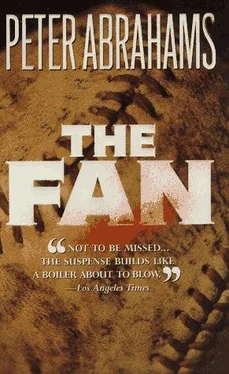Peter Abrahams - The Fan
Здесь есть возможность читать онлайн «Peter Abrahams - The Fan» весь текст электронной книги совершенно бесплатно (целиком полную версию без сокращений). В некоторых случаях можно слушать аудио, скачать через торрент в формате fb2 и присутствует краткое содержание. Жанр: Триллер, на английском языке. Описание произведения, (предисловие) а так же отзывы посетителей доступны на портале библиотеки ЛибКат.
- Название:The Fan
- Автор:
- Жанр:
- Год:неизвестен
- ISBN:нет данных
- Рейтинг книги:4 / 5. Голосов: 1
-
Избранное:Добавить в избранное
- Отзывы:
-
Ваша оценка:
- 80
- 1
- 2
- 3
- 4
- 5
The Fan: краткое содержание, описание и аннотация
Предлагаем к чтению аннотацию, описание, краткое содержание или предисловие (зависит от того, что написал сам автор книги «The Fan»). Если вы не нашли необходимую информацию о книге — напишите в комментариях, мы постараемся отыскать её.
The Fan — читать онлайн бесплатно полную книгу (весь текст) целиком
Ниже представлен текст книги, разбитый по страницам. Система сохранения места последней прочитанной страницы, позволяет с удобством читать онлайн бесплатно книгу «The Fan», без необходимости каждый раз заново искать на чём Вы остановились. Поставьте закладку, и сможете в любой момент перейти на страницу, на которой закончили чтение.
Интервал:
Закладка:
“Is that one of the questions?”
“Yes.”
Bobby shrugged. “He was a brother.”
“Brother?”
“Fraternity brother. I didn’t know him well back then-he was a year or two ahead. And a bit of a…”
“Nerd?”
“I was going to say dweeb. That’s not for publication.”
“Of course not. Funny how the dweebs of yesteryear become the movers and shakers of today.”
Bobby frowned. “Chaz isn’t a mover and shaker. He’s my agent.”
“Do you know how many other clients he has?”
Bobby shrugged. “Boyle, for one.”
“Primo?”
“No.” Bobby put down his glass.
So did Jewel. “I’ve done some research. Charles Wald has twenty-three clients in baseball alone, sixteen in the majors as of Opening Day. Doesn’t that make him a mover and shaker?”
“He’s just an agent,” Bobby said, but then he remembered the four pillars, and wasn’t sure.
“He probably makes more money than you do, Bobby.”
Bobby was appalled. He picked up his glass and drained it; then saw that she was looking at him in that measuring way again, her head slightly tilted.
“Why do you want to be traded, Bobby?”
Jewel watched Bobby’s face as he dealt with that one. First came surprise, then anger, then wariness.
“Who says I want to be traded?” he asked.
Jewel refilled their glasses. This was too easy. Not that Bobby was stupid; it was just that she was a woman and he, in many ways, still a boy, as Wald had said. That was the appeal, of course; maybe the appeal of the whole game. The realization that this was a mismatch made her feel bad, in passing. “Word gets around,” she told him, and pressed on. “Does your wanting to be traded have anything to do with Primo?”
“I don’t know what you’re talking about.”
And on: “Is it because he’s having a career year and you’re in this horrible slump?”
Bobby negated that suggestion with a sweeping gesture of his arm; his glass crashed on the flagstones. He raised his voice. “I’m not in a slump. They’re just not falling in.”
The sudden violence didn’t frighten her; it confirmed that she was on the right track. She nodded and said, “Sometimes it must feel like you’re never going to hit again.”
Jewel expected another demonstration of annoyance, frustration, rage: more raising of the voice, more shattering glass, something. But there was nothing. And then in the candlelight, she saw his eyes fill with tears: the doubly reflected flame trembled, wobbled; but there was no overflow.
She wasn’t ready for that. “Excuse me.” She went inside to the bathroom, splashed cold water on her face; a hard face, she saw in the mirror, with Janie way underneath. She also saw a new gray hair, which she plucked. When she returned, Bobby was drinking a beer and his eyes were dry. He tried to make them opaque as she came near. Jewel didn’t want that, didn’t feel like pressing him anymore. She could fill in the gaps without him.
“Ready?” she said.
He nodded. She paid. They went to the car. On a whim, she took the bottle of champagne, still half full, with her. On a whim: that was what she told herself.
Jewel drove along the narrow mountain road that led to the head of the nearest canyon. She no longer drove fast; there was no traffic, the night was quiet, Bobby silent. A baseball-sized rock fell out of the darkness into the cone of her headlights, bouncing on the pavement, and back into the night. She slowed down even more; that was the only reason she spotted the lookout around the next bend. Without thinking, she pulled off the road, continued between two tall rocks like gateposts, and parked on the edge of a black abyss. Without thinking: that was what she told herself.
In the distance lay the coast highway, traffic crawling along it like glow-worms. Then came a white fringe of surf, and beyond that the sea. Jewel felt Bobby’s eyes on her.
“Black as night,” she said,
“My heart,
Black as coal
Black as the ace of spades
Black as the blackest cliche,
Heart of my heartest heart,
Come give me a love.”
There was a silence. Then Bobby said: “What’s that?”
“The beginning of my poem,” Jewel replied. “The prize-winning poem.”
“You’re scaring me,” Bobby said.
Jewel laughed. “There’s nothing to be scared of,” she said, although she was trembling when she said it. Then she put her arm around him and kissed him on the mouth. He kissed her back, but tentative, almost shy. That surprised her.
And it surprised her when he said: “Are you making up for high school?”
“You’re very smart, for a ballplayer,” Jewel said. She kissed him again. She felt the strength of his body, the night all around, soft and warm, the abyss so close; everything conspiring with the mood she was in. “Take off your clothes,” she said.
He did.
His body was beautiful, as beautiful as the most beautiful cliche. She must have known that already, of course, having seen him many times in locker rooms, but she hadn’t let it register: that was the rule.
She put her lips to his chest, then started slowly down; going down on him, as so many women, or girls, did every season. She didn’t want to be one of them-did they have sex as infrequently as she, once in the last year, not at all in the two years before that? — but she wanted to go down on him anyway. She was close to coming already, and that wasn’t like her either.
Bobby stopped her. He drew her head up, level with his. The look in his eyes was complex; she would parse it later. Her own eyes, she supposed, were wide black holes of lust.
“You too,” he said.
“Me too, what?”
“Your clothes.”
“No.”
“Yes.”
He helped her. She didn’t resist.
“Not bad, for an old lady,” he said.
“There’s an endorsement.”
“Here’s another.”
Then they were in the back seat; starry sky, soft night, abyss. And Jewel was having sex unlike any she had known; or so she thought. She fell under the illusion-did it have to be an illusion? — that something had clicked into place, and her whole life suddenly made sense. She came and came.
After, when they were dressed and sitting in their proper places in the front of the Hertz convertible, Bobby surprised her once more: “Will I see you again?”
A surprise, and a nice one, but she didn’t want to think about all the problems-how could they see each other, as long as they did what they did? Also, she didn’t want moony talk: she wanted to stay in this mood. She swigged from the bottle, then shook it and sprayed champagne into the night. “Here’s to singles up the middle and doubles in the gap, to round-trippers and grand slams.”
“Double entendre, right?” said Bobby.
“As double as it gets,” said Jewel, thinking it might not be a mismatch after all. She hurled the bottle over the edge.
26
4:15 A.M., but Bobby Rayburn didn’t feel at all tired as he opened the door to his room at the Palacio. He felt light and quick and cheerful. It didn’t last. A man was sitting at the desk, wearing a dark suit and a dark tie, a half-eaten Reese’s Peanut Butter Cup in one hairy hand.
“Mr. Rayburn?” he said. “I’m Detective”-Bobby missed the name-“of the LAPD. Mind telling me where you’ve been?”
Bobby tried to remember if the Sox had a curfew. Had Wald mentioned something about that? He couldn’t recall. But sending a cop to enforce it was way out of line.
“Yeah,” Bobby said. “I do mind. And what gives you the right to come in here without my permission?”
With his free hand, the detective removed an envelope from his jacket pocket. “This warrant, signed by an honest-to-goodness judge.” He held it out, but Bobby made no move to take it. The detective popped the rest of the Reese’s Cup into his mouth, licked his fingers, and rose. He was short and round, with a day-old beard and purple bruises under his eyes. “I’ll give you a lift to the station,” he said.
Читать дальшеИнтервал:
Закладка:
Похожие книги на «The Fan»
Представляем Вашему вниманию похожие книги на «The Fan» списком для выбора. Мы отобрали схожую по названию и смыслу литературу в надежде предоставить читателям больше вариантов отыскать новые, интересные, ещё непрочитанные произведения.
Обсуждение, отзывы о книге «The Fan» и просто собственные мнения читателей. Оставьте ваши комментарии, напишите, что Вы думаете о произведении, его смысле или главных героях. Укажите что конкретно понравилось, а что нет, и почему Вы так считаете.












